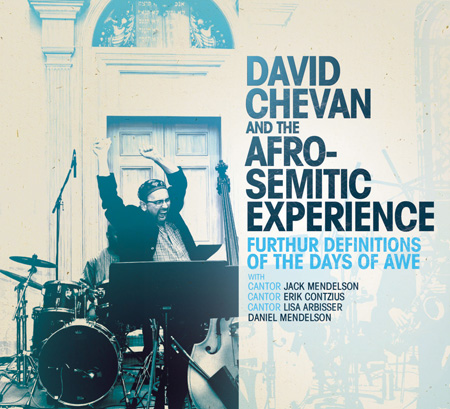
The Afro-Semitic Experience, Further Definitions of the Days of Awe
When I noticed this new album was called Further Definitions of the Days of Awe, I had to go listen again to The Days of Awe: Meditations for Selichot, Rosh Hashanah and Yom Kippu. That 2003 CD was billed as a solo project of Afro-Semitic Experience co-founder David Chevan’s 2003 but features the Afro-Semitic ensemble as well as Frank London. The yesterDays of Awe made me backtrack further to Afro-Semitic’s 2005 Plea for Peace and finally all the way home to Chevan and Warren Byrd’s This Is the Afro-Semitic Experience, the first album to use that name.
I could have dug out Chevan’s old Bassology recordings, where the roots for his musical cross-pollinations began. But I’d already done that last month, going on a Bassology binge without suspecting that a new Chevan disk was coming in the mail.
Not that everyone would (or should) do such dutiful scholarship.
But what’s most notable and remarkable about the Afro-Semitic Experience is how it gets you craving more. The band works with ritualized formats which suggest regular worship. I’m not Jewish, and don’t observe the Days of Awe which presage Yom Kippur. But I do observe the Afro-Semitic Experience.
Further Definitions of the Days of Awe is a live album, but the only difference between it and the studio records is that you can hear an audience cheering and applauding. Afro-Semitic albums always sound live. When cantors are enlisted as vocalists, they sound genuine and openly emotional, not studied or pristine. The band improvises readily and can really create a wall of sound if they wish, but also know when to politely sit aside and let Warren Byrd do a sweet, subdued, piano solo.
Afro-Semitic Experience has existed under that name for a decade now, and boasts the same five core members: Chevan on bass, Byrd on piano, Will Bartlett on various clarinets and saxophones and percussionists Alvin Carter Jr. (behind a drum kit) and Baba David Coleman (on congo drums). Trumpeter Frank London’s back for the New Haven one of the three concerts from which this recording was culled. (The others were in New York City and Greenfield, Mass., and all took place just before Rosh Hashanah last year.) One notable absence on this album is guitarist/violinist Stacy Philips, but you can’t have everything.
Actually, Afro-Semitic Experience suggests that maybe you can have everything. They enlighten, uplift and entertain. They respect traditions even while placing them in odd juxtapositions, and they improvise wildly. They bring in guest players from rabbinical chanters to electronicists, yet retain their key characteristics.
The effort it must take for the musicians to maintain such balance, grace and reverence while following their experimental instincts seems extraordinary. Miraculous, you could say. An interfaith blend of African rhythms, be-bop jazz and any Jewish music which can be applied, from klezmer to classical and, of course, cantorial. On the two-part “Ashrei,” beats get sprightly behind fervent wails. Then the horns kick in. “Viddui” opens with a sultry soul melody, almost a midnight groove. But instead of Marvin Gaye’s back-up singers, there’s a bunch of guys chanting in loose harmony, in Hebrew.
Describing the Afro-Semitic Experience always sounds funny to some people, like it’s some sort of forced conceptual joke. Which is why you must, to borrow a word from the band’s name, experience it. This CD, which shares one of the band’s own favorite rituals—backing Cantor Jack Mendelson at the midnight Selichot service at a synagogue in White Plains, New York—is an awesome place to start.

Thank you for the beautiful review. It was an honour for me to work with wonderful bassist David Chevan ‘s great band, introduced to me by my partner, not only in music, pianist/vocalist/composer Warren Byrd. It was very special to perform with the cantors alongside only for one concert with my fantastic collegue Frank London in the horn section together with fine sax player Will Bartlett. Musically yours, Saskia Laroo (trumpet)